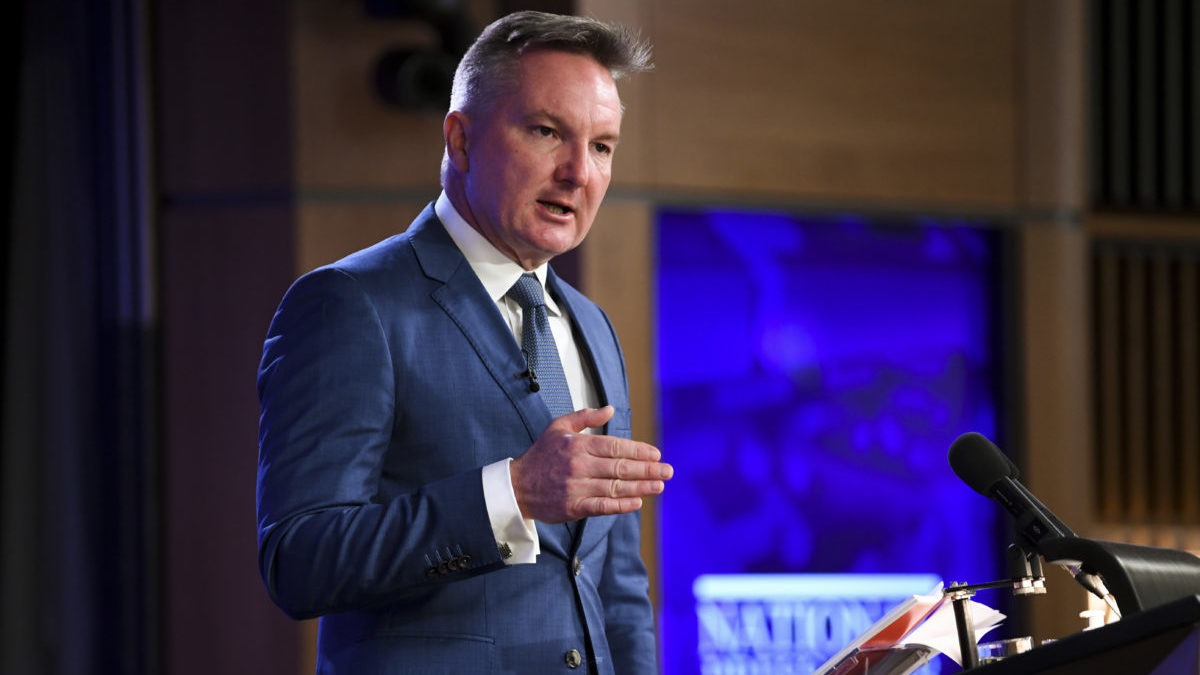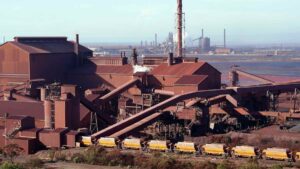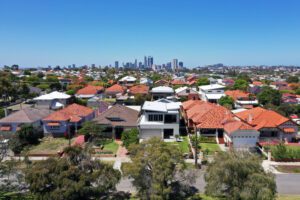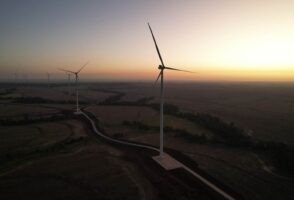Labor climate and energy spokesperson Chris Bowen says he, and Labor, are ready for a fight with the Morrison government over climate change policy, insisting that Labor had not shied away from differentiating itself from the Coalition ahead of the looming federal election.
In what was, at times, a fiery address to the National Press Club on Monday by a shadow climate minister seemingly frustrated with criticism of his party’s newly unveiled policy package, Bowen said Labor had “paid a big price in these climate wars” but it was still committed to winning the argument on climate policy.
“There are some keen observers who predicted that Labor would simply match the Coalition’s approach to climate to minimise the risk of yet another destructive scare campaign from a government that has no record and no agenda to campaign on,” Bowen said.
“As if signing up to their weak and pathetic targets and effectively endorsing the politics of division might be an effective tactic to convince people to vote Labor. As far as I’m concerned, this was never going to happen.”
Bowen used the address to further flesh out Labor’s new policy platform, but primarily to defend the policy from early criticisms that have been levelled by both the Morrison government and some media outlets – and issuing a challenge to Angus Taylor to a debate over climate policy.
Bowen rejected assertions that Labor’s policy could, in effect, be a commitment to a target as high as 48 per cent, as has been suggested in some outlets.
Labor’s target uses government projections that show Australia on track to achieve a 30 per cent emissions reduction in a ‘business as usual’ policy environment as a baseline, and the party’s new policy platform is designed to deliver additional reductions to achieve a 43 per cent total reduction by 2030.
However, the Morrison government has been relying on projections based on a hypothetical scenario, based on rapid technology uptake, that would see the starting point be a 35 per cent reduction and which would push Labor’s target to 48 per cent.
Bowen rejected this latter scenario, saying the modelling commissioned by the opposition party was based on the only credible pathway and suggesting Morrison’s preferred projection was not realistic.
“[Reputex] advised us that the correct conservative starting point was 30 per cent,” Bowen said. “They regarded that as being the starting point which was defensible from an economic modelling point of view. They did not regard 35 per cent as a defensible starting point.”
Bowen confirmed that Labor would seek to legislate its target, along with new accountability and reporting measures that would require the relevant climate minister to produce an annual report to parliament on progress towards the legislated targets.
“They won’t introduce legislation because they’d be embarrassed on the floor of the parliament by the climate change deniers,” Bowen said. “I’ll introduce the Climate Change Bill as the minister for climate change and will report annually to parliament on progress because we want to be held accountable.”
But Bowen also ruled out the prospect that Labor could look to negotiate a potentially more ambitious climate target, should the Greens find themselves with the balance of power after the next federal election.
The Greens are targeting the balance of power in both houses of parliament and are taking a 75 per cent reduction target for 2030 as their policy to the next election.
Should the Greens have the balance of power, it would look to negotiate a climate policy package, as it did when the party negotiated the ‘Clean Energy Future Package’ under the Gillard government. But Bowen suggested any changes to the 2030 target were off the table.
This prompted Australian Greens leader Adam Bandt to criticise the new Labor policy platform for its failure to plan for a phase-out of fossil fuels, despite its assumptions that renewables will make up 82 per cent of total generation on the main grid by 2030.
“Labor proudly says that not one coal-fired power station will close earlier than under the Liberals, that coal and gas mines can keep growing and that the Beetaloo methane bomb will be supported,” Bandt said.
“Disappointingly, Labor is now joining the Liberals: giving in to the coal and gas corporations and giving up on the science.”
The 43 per cent emissions reduction target is a slight reduction on the target Labor took to the 2019 federal election. Bowen said that the target remained informed by climate science, as well as what could be achievable by a Labor by a 2030 deadline if it was to form government in 2022.
“In relation to the science, of course, we are driven by science. But we’re also driven by what’s achievable coming to office in 2022 for a 2030 target. Things that were achievable in 2016 or 2019 become harder when you come into office in 2022,” Bowen told the press club.
However, it is notable that Labor’s target comes in below those recommended by the Business Council of Australia and the Australian Industry Group, two business groups that have advocated for a 50 per cent emissions reduction target.
Bowen made clear that he is willing to take up the political fight over climate change policy, welcoming the prospect of a debate with Taylor on climate, adding that he was willing to do an “empty chair” debate should Taylor refuse.
See also: Labor has produced a brilliant renewables plan wrapped up in a terrible climate plan
And: Explainer: Labor plans 85 “solar banks” to open up solar to renters. What are they?
And, from July: Energy Insiders Podcast: Chris Bowen on Labor’s “policies, not targets” climate pitch
Lies, myths and greenwashing. Good independent journalism is time-consuming and costly. But small independent media sites like RenewEconomy have been excluded from the tens of millions of dollars being handed out to big media companies from the social media giants. To enable us to continue to hold government and business to account, to cut through the lies and the misinformation about the renewable transition, and to help expand our work, you can make a voluntary donation here to help ensure we can continue to offer the service free of charge and to as wide an audience as possible. Thank you for your support.










